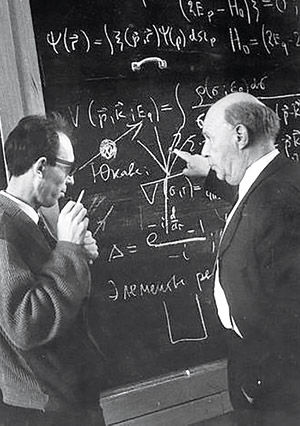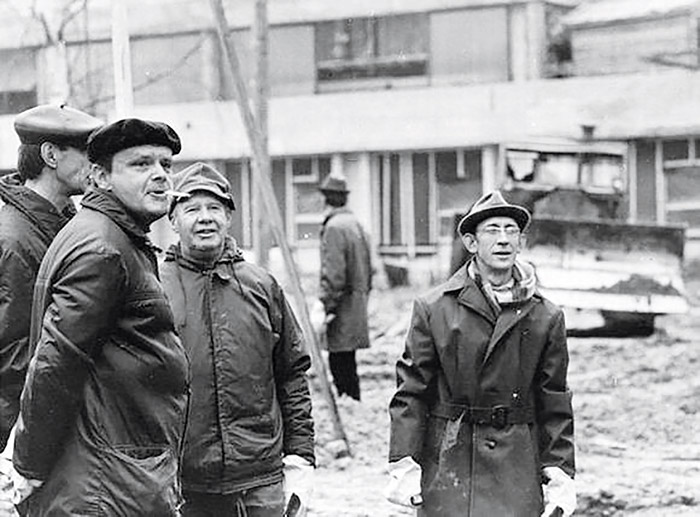
Electronic english version since 2022 |
The newspaper was founded in November 1957
| |
Their names are in the history of science
Dmitry Ivanovich with all his personality
To the publication of D.I.Blokhintsev's "Diaries"
So, the long-awaited event came true - in May, the magnificent book "D.I.Blokhintsev. Diaries of 1955-1975" was published. This is a significant event and not only in the life of our Institute: Dmitry Ivanovich's contribution to the development of science in our country and its representation in the world scientific community is undeniable. An outstanding scientist and a great founder, standing at the origins of the establishment of two major scientific centers - the Institute of Physics and Power Engineering in Obninsk and the Joint Institute in Dubna, the first Director of these institutions, Dmitry Ivanovich Blokhintsev was a man of an amazing variety of talents and interests, a man of a fading, unfortunately, breed of powerful universals of knowledge and culture.
Our newspaper has already responded to the release of the "Diaries" in the issue of 9 June with a wonderful article by A.Rastorguev and a story by G.Myalkovskaya about the presentation of the book at the Museum of History of Science and Technology of JINR, including a detailed interview with the Director of the Museum N. Kavalerova. The main task of this article is to present the greatness of Dmitry Ivanovich's personality on the basis of the Diaries. He was obvious to a close circle of colleagues and students who closely collaborated with him, but before a wide circle of readers, for the first time, his versatility appeared in all its magnificent fullness. Here is how D.I. himself marked its edges, lining them up as a ladder:
- "I am a theoretical physicist.
- I am a philosopher.
- I am an engineer.
- I am a poet.
- I am a painter.
- I am a diplomat." (p. 291)
Almost all of these facets-steps are highlighted in sufficient detail in diary entries. So,..
I am a theoretical physicist
 |
| At BLTP with A.V.Efremov. |
"The nails are already in the blood, but you have to climb again and again, and I will climb again and again, despite everything" (p.101). This is not an entry of a rock climber as D.I. was, this is an entry of a theoretical physicist about the difficult ways of addressing the tasks set for himself.
"I remember S.I.Vavilov saying, "Colossal, vertical and pyramidal - but once great discoveries were carried out on the table" when he saw the accelerators."
Today they like to discuss the "full set of experiments." But perhaps the "full set of thoughts" is more important! (p.45).
"I left the post of Director, risked lowering myself in the "rank" (it has always been the most dangerous step in Russia), and this all is for devoting the rest of the years to address the task that has been hypnotized for many years ..." (p.306).
"Science becomes a profession. Scientists will not differ from the average people of their time... But there will always be a narrow caste - god-marked adherents of a religious attitude to science... People who bow before the secret beauty of the world, eager to be intoxicated by it, pray to it and understand it. People who relate to nature not as a boastful lover, but bow before its beauty and as a secret knight..." (p.164).
I am a philosopher
The previous entry was, in fact, about the thoughts of not only a scientist, but also a philosopher. And in this incarnation of D.I. - both in the widest range of writers-thinkers' books he had read and in his own reflections these entries appear to us many times:
"... truth is born in a dispute." Isn't this opinion wrong? Who said that? Truth is born in reflection" (p.132) (Hereinafter, those parts that are typed in italics in the "Diaries" are indicated in the article in bold type. Brief abbreviations in quotations are marked with /.../).
"Individualism is the death of society and collectivism is the death of the individual. Development is possible only in their contradiction.
The path of "collectivism" can lead us into "the brave new world" (Huxley1). The path of individualism is to the world of weakness, barrenness and impotence" (p.58).
"The mindset of a real scientist has always been and will be opposite to the mindset of rulers, for only the mind of a scientist is capable of boundless and merciless self-criticism and criticism" (p.105).
"300 years of the Tatar yoke, 300 years of landlords and tsars look into our time with a terrible grimace ..." (p.111).
"From revolution to revolution, life is best for the philistine and petty bourgeois. They will forever be alive, they will forever be the best defense of the Rulers from people who are restless, thinking, from the hated INTELLIGENTIA "(p.162).
"The new was born not under the cheers of the crowd. The new was born under the cries of "Crucify him!" (p.183).
"...true art is always in opposition to its time, for it discovers something new and calls into the distances unseen and unheard of.
The creators of the new are always heretics. To them and my glory "(p.57).
"(A tame poet is not a poet, but a calf. I think this is eternal, this is the dialectics of any era: the new that is born in it conflicts with the old one. It was yesterday, it is today, it will be tomorrow.)
And the great Saltykov-Shchedrin will never be born to sing the wisdom of those in power on the harp" (p.52).
"The Russian intelligentsia is not a profession, not a position... These are people of high spiritual culture and responsibility - from any social stratum... Can every academician be called an intellectual?! No! Only a few! Can all workers be considered non-intellectuals? No! Many of them are intellectuals in the highest sense of the word" (p.181).
"Yesterday I watched Stanley Kramer's Judgement at Nuremberg. I had nightmares all night... It's terrible to watch this film and keep on being silent and silent... Only officials can speak... We must be silent... What do we do for the world? The best people have gone to their craft or art or like soldiers do their duty ... Great God! Help us, your creatures, to step over the barrier of our ignorance..." (p.139).
And here is the entry after reading the memoirs of G.Zhukov:
"Millions of extra victims - that's the price of Stalin's stupidity that gave rise to a wild idea about the possibility of peaceful coexistence of the country of communism and the country of fascism.
His authority was indisputable. Was it authority? Rather, fear, it was fear that reigned in his retinue. And what about the ridiculous idea of calling the German embassy in the morning of June 22! Oh, my God! What stupidity! How scary! How terrible!
Nothing to say, Comrade Zhukov defended the great personality of Comrade Stalin!" (p.192).
"If only there were fewer historical figures for our people, this is a very expensive pleasure" (p.37).
"The tragedies of Shakespeare are nothing compared to the tragedy of our time. Hamlet was tormented "to be or not to be?". Only one Hamlet. Now all of humanity asks this question" (p.104).
I am an engineer
In 1951, by the decree of the Council of Ministers of the USSR, D.I.Blokhintsev and P.I.Zakharov were appointed responsible for the construction of the Nuclear Power Plant in the city of Obninsk. In June 1954, the world's first Nuclear Power Plant was successfully launched.
In 1955 D.I. advanced the idea of a pulsed fast neutron reactor. Under his leadership, in 1960, IBR-1 was constructed at JINR and then he supervised the construction of a more powerful IBR-2 reactor that was put into operation in 1981, at the initial stage of the project. Moreover, D.I. was present and gave valuable instructions not only at the launch of IBR-1 and the physical launch of IBR-2 in 1977, but also took part directly in the construction of both reactors that was captured more than once by our photo chronicler Yu.A.Tumanov and here is such an entry in a diary dated 19 April, 1975:
"Today I was at the Lenin Subbotnik. We worked for IBR-2. We covered with concrete one of the rooms. Frankly, I love physical work, I also love construction sites ... Books too ... I oppose all this to the hustle and bustle of meetings, sessions ..." (p.332).

1974 On Subbotnik at the construction of the IBR-2 reactor.
I am a poet
The author of the "Diaries" was a man of the broadest culture and on their pages you will find a lot of names of writers and poets of different times and different countries - from the Bible and Dante to V.Mayakovsky and B.Pasternak. And often these are not just mentions, but citations and he often quotes poets in the original language. But Dmitry Ivanovich strongly loved poetry - he wrote poetry himself. More than once they were published in magazines and some of them were included in the collection "Muse in the Temple of Science" (M.Sov. Russia, 1982; republished in 1988). Occasionally, poems by D.I. were born directly in the course of writing the diary. Here, for example, is an excerpt from a poem on page 141:
/.../ I love to be
Indistinguishable
From the sky and from the grass
From water and land...
(From people...)
Great sky! Grasses
And the forests of the earth!
High mountains,
Rocks and snow
Shelter me
From piercing eyes
Those who have power.
Let them squabble among themselves!
But much more often the poetic nature of D.I. manifests itself in those fragments of the text that can be safely called poetry in prose. Here is his reaction to seeing a thousand-year-old sequoia for the first time in America:
"Sequoia, huge, with an incomprehensibly gigantic base, seems to want to say: "When I was small and young, the pharaohs had not yet begun to build pyramids. I'm in no hurry to live. You will not be and I will look at others, at many, many others. They will come to bow to eternity. But can they understand it? (p.40).
Here is his response to the passage of cranes:
"They were so far away that I found them by "kurly-kurly". They walked in an irregular triangle, high above the city.
/.../ Goodbye, cranes.
/.../ We do not know the psychology of other living beings well. We take a simple position, denying them thinking.
However, what do cranes think about? Do they feel good or bad? Are they happy with the flight? Are they, finally, happy?
And you, man, say,
Are you happier now
Than in the cave age?
(Did the atom make a person happy?)" (p.56).
Here is an interspersed story about the 9th International Conference on High Energy Physics in Kyiv in 1959:
"I was in the Vladimir Cathedral. /.../ I listened to the choir /.../.
Sounds rushed under the high vaults, reflected and took off again and sounded from there quite far away ...
/.../ And I also heard "Now you are letting go...", and everything was so simple and majestic in its simplicity and immediate comprehensibility. The soul rested from the crackle of modern life. It was very, very good... It seemed that life and death and the past and the present and the unsolved future all merged into a harmonious unity and the sounds flying in the temple spoke of this harmony, of its significance and depth (p.77).
(To be continued.)
1 Aldous Huxley (1894-1963) was an English writer, science fiction writer, short story writer and philosopher. He is the author of the famous dystopian novel Brave New World.
G.Vardenga